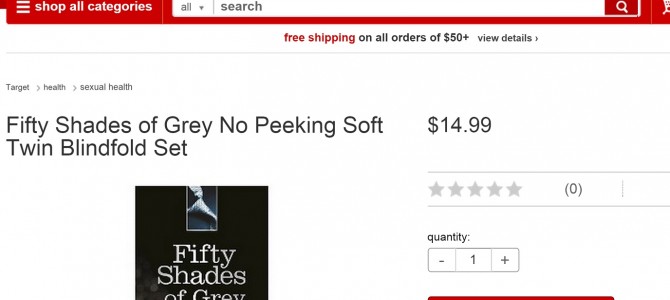
Yeah, it makes me uncomfortable that Target now carries “Fifty Shades of Grey” lube and blindfolds in its Health and Beauty section. But if we are ever going to see the trend toward indecency in what retailers stock reversed, we should drop the poster-board and markers and strike up a neighborly conversation about decency and morality instead.
Boycotts, protests, hashtag campaigns, and demands that retailers ban a product may grab public attention, and they may even pressure a retailer into pulling the offending stock from the shelves, but they do little to influence pop culture. Unfortunately, many from the far Right see pop culture as something massive, unwieldy, and unfamiliar, a wild beast to manage with tethers and cages rather than tame.
We separate, and when the volatile animal that is pop culture nips at us, we crack the whip as a warning sound that the claws may momentarily recede. This reaction may create just enough discomfort to reverse some small matter of indecency: A pair of sex cuffs here, a sexually explicit children’s book there. We are ever so slightly comforted by the sound of them dropping from the shelves.
But in our indignation we forget the most basic elements of the free market: supply and demand. Acute pressure on specific companies, the suppliers, does not change long-term popular thinking on what is decent and what is not.
Demand for Depravity Isn’t Going Away
We’re talking about a country that made “Fifty Shades of Grey” a bestseller. The media that elevated a third-rate college porn star, Belle Knox, to celebrity status. The culture in which semi-explicit sex scenes on television are banal. In other words, there is a demand for depravity. The opposition tends to place its focus entirely on the supplier, ignoring the fact that suppliers only carries these things because they perceive a demand for such products.
Nearly 8,000 petitioners on Change.org want the novel “Fifty Shades of Grey” banned on the basis that, in the novel, “men are portrayed in a way that gives women unrealistic expectations of us when it comes to intimate relations. This can lead to many men being the subject of scrutiny and embarrasment [sic] in real life, which is unacceptable as it can lead to depression and low self-confidence.”
While I wholeheartedly agree with this author’s sentiments, I believe he and the other signers are going about “change” in the wrong way.
The “low self-confidence” he mentions will always come from somewhere. If not “Fifty Shades,” then some movie or TV show or any of a thousand romance novels out there. Or Greek statues. Or Michelangelo paintings. Pulling “Fifty Shades” from Target shelves might grant this man momentary satisfaction, but it’s just a bucketful of water cast out of a sinking boat.
The inventory choices of a corporate retailer in the area of sex and morality really boil down to what we as a community are eager to consume. Is it sex? Then the free market will supply us with it. Is it intellectual stimulation, art, or exploring the world around us? Then we shall have more of that. Lack of demand will not only remove any product from stores, but prevent the sale of similar items in the future.
Five Ways to Influence Demand for Smut Without Banning It
So the question then becomes, how does one go about influencing culture? How do we go about taming the beast?
1. Drop your whip. Lashing out in judgment and self-righteousness only causes anger and distrust of the religious community; not every morality protest is characterized by this, but too many are. Rather than capturing market share, you alienate consumers. This is an extreme example, but who on earth wants to hear more from the Westboro Baptist Church after seeing signs on the street corner saying you’re going to hell? Judgment doesn’t make someone want to hear your sales pitch.
2. Humble yourself. After all, it’s not as if you have never lusted before, or gazed a little too long at those magazines in the checkout line. Remember that we all sort of suck at being moral (it says so inRomans 3). When we pretend to be more righteous than we are, people can smell it, just like consumers can smell a gimmicky salesman. Holier than Thou is a fragrance we spritz ourselves with in the morning right after our devotionals, and, boy, is it pungent.
3. Get familiar with the paradigm of your mainstream counterparts. Please don’t take this as an encouragement to go raving with your college buds, but you should at least know what a rave is. If you are a Christian, you’re probably familiar with the concept of being in the world, but not of the world.
What’s that mean? It means you and “those other people” share this world. There’s a reason it’s called popular culture. So start acting like it belongs to you, too. It’s not going to kill you to know who Jay-Z and Katy Perry are, to know the lyrics to a couple Taylor Swift songs, or to know that Stephen Colbert will be hosting the Late Show. I have church friends who memorized the “Single Ladies” dance, and I know a Christian youth leader whose favorite song was “Party in the USA” by Miley Cyrus. Shared knowledge bridges the gap between pop culture and religious counterculture.
This bridge may not be obvious, but its absence is glaring. As a teenager, I had a couple of very nice friends who wouldn’t (or couldn’t) watch TV or movies. It’s not just that the volume of popular references they missed were enormous, but it created a sense of separation, that you and they had very little in common, despite their wonderful personalities.
Knowing the landscape of your culture makes it easier to navigate, and easier to guide friends from one side of the mountain to another. I’m not suggesting we all veg out on TMZ every night, but a basic understanding and modest knowledge base of pop culture is useful, just like a business person gathers consumer data. She wants to know what and where consumer demands are.
4. Walk the walk. Be a kind, modest person. Refrain from screaming at bad drivers, and don’t hesitate to avert your eyes when everyone’s watching that racy scene. Believe me, few viewing experiences are more awkward than trying to fast-forward through a GoDaddy Superbowl ad…when you’re watching live TV.
I execute these kinds of avoidance maneuvers fairly often, and sadly, the awkwardness of that never goes away, although I find it helps if you pretend you’re a parent and your eight-year-old is sitting next to you.
The next time you’re watching TV with your friends, choosing modesty will probably feel painfully awkward, but anyone can see that you aren’t compromising your principles, and it won’t take standing for hours in the cold with a “Stop Selling Pornography” sign for people to see that.
5. Have a conversation. I don’t mean one of those dutiful bipartisan conversations about “coming together” and “finding common ground” and otherwise putting on a moderate face. I mean just have a conversation with a friend over coffee and exchange some perspective. Be prepared to share why you believe what you do, and why you think certain things are wrong or harmful.
If you’re not quite sure why you feel sex toys derived from “Fifty Shades of Grey” promote deviance and are not things we should see in our grocery stores, or you don’t know how to articulate it, figure it out. Seek wisdom; ask your pastor, priest, or rabbi, read the Bible, some C.S. Lewis, or whatever it may be.
Your ability to articulate your own principles matters quite a bit, but not as much as the way you live them out. As frustrating as it may be, the ability of everyone who objects to the sale of depravity in the public marketplace to actually live a moral life and a healthy life, and to explain the relationship between the two, is what will make the biggest moral difference in the long term.
Those on the Right tend to be very good at compartmentalizing, at separating “culture” or “religion” from “economics.” (Indeed, one could argue this separation is the foundation on which social conservatism rests). But the Right would do well to recognize this compartmentalization and tear down those barriers that inhibit the making of wise and informed maneuvers in the culture wars.
Don’t get sucked into the vortex of corporate condemnation. This front of the culture war is about demand, not supply.
It is not enough to simply have your heart in the right place. Your brain should be in the right place, too. Don’t check your economic savvy at the doors of the church, just as you don’t check your morality at the doors of Target.








